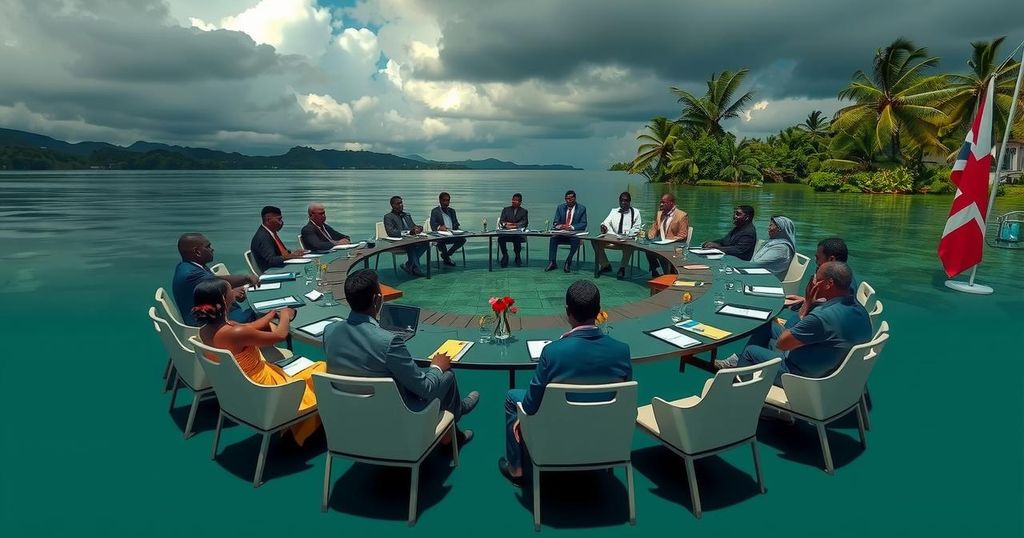Commonwealth Summit in Samoa: Addressing Climate Change and Reparations for Historical Injustices
The Commonwealth Summit in Samoa addresses climate change and reparations for Britain’s historic role in slavery, gathering leaders from 56 countries, including small island nations vulnerable to rising sea levels. Some leaders call for adherence to the Paris Accord, while discussions on reparations gain momentum amid differing opinions on the matter.
On Thursday, leaders of the Commonwealth nations convened in Samoa for a summit addressing pressing issues such as climate change and the question of reparations for Britain’s involvement in transatlantic slavery. The Commonwealth Heads of Government Meeting (CHOGM), attended by representatives from 56 countries predominantly linked to the British Empire, commenced on Monday with King Charles presiding over the discussions. A significant portion of Commonwealth members consists of small nations, notably low-lying island states vulnerable to the adverse effects of climate change. Maina Vakafua Talia, the climate change minister from Tuvalu, emphasized the urgency of adhering to the Paris Agreement’s target of limiting global warming to 1.5 degrees Celsius, cautioning that new fossil fuel projects pose a “death sentence” for nations at risk. “We call on our wealthier partners to align themselves with this goal and not fan the flames of the climate crisis with fossil fuel expansion,” he asserted. In light of these concerns, leaders are expected to release a declaration focused on ocean conservation, with climate change as a central theme. Australian Foreign Minister Penny Wong echoed the urgency of the matter, declaring, “Climate change is an existential threat. It is the No. 1 national security threat. It is the No. 1 economic threat to the peoples of the Pacific and to many members of the Commonwealth.” As global temperatures rise in the Pacific Islands at triple the global average, United Nations Secretary-General Antonio Guterres noted that affected populations are “uniquely exposed” to the repercussions of this environmental crisis. On Thursday, King Charles was scheduled to witness firsthand the impact of rising sea levels, as highlighted by a Samoan chief. Amid these discussions, the summit will also tackle the contentious issue of reparations regarding Britain’s historical role in slavery. This demand, particularly from nations within the Caribbean Community (CARICOM) and the African Union, has gained traction in recent years. British Prime Minister Keir Starmer, prior to the summit, asserted that Britain would not formally address reparations during the meeting, stating his preference for a forward-looking approach rather than focusing on past wrongs. However, CARICOM representatives insist that CHOGM is a vital opportunity to commence dialogue on this matter. Eric Phillips, a representative from CARICOM’s commission seeking reparations from former colonial powers, criticized Starmer’s approach, expressing confusion over the Commonwealth’s relevance if it does not engage with historical injustices. Despite official positions, discussions regarding reparations were acknowledged to be occurring behind the scenes, with indications that draft conclusions of the summit included calls for these critical conversations. Opposing views on reparations highlight a divide over whether contemporary nations should bear responsibility for historical injustices. Proponents argue that the legacy of slavery continues to create significant racial disparities. As articulated by Kingsley Abbott of the Institute of Commonwealth Studies, “Whenever those affected by atrocities ask to talk, there should always be a willingness to sit down and listen.” Historically, from the 15th to the 19th century, over 12.5 million Africans were forcibly taken into slavery and sold to work in deplorable conditions, leading to profound and lasting societal impacts in both the Americas and their origins.
The Commonwealth Summit in Samoa serves as a pivotal gathering for discussions concerning climate change, which poses a severe threat to many member countries, particularly small island nations susceptible to rising sea levels. This year’s summit also addresses reparations for transatlantic slavery, reflecting a growing global discourse on the historical responsibilities of colonial powers. The focus on both environmental and historical justice signifies the Commonwealth’s recognition of its complex legacy and current global challenges.
In conclusion, the Commonwealth Summit in Samoa highlights the urgent need for comprehensive dialogue on climate change and reparations for historical injustices. The voices of vulnerable island nations underscore the existential threat posed by climate change, while the persistence of demands for reparations reflects ongoing discussions regarding accountability for systemic racial inequalities stemming from slavery. The outcomes of this summit may set impactful precedents for collaborative efforts in addressing these two critical issues.
Original Source: stratnewsglobal.com




Post Comment